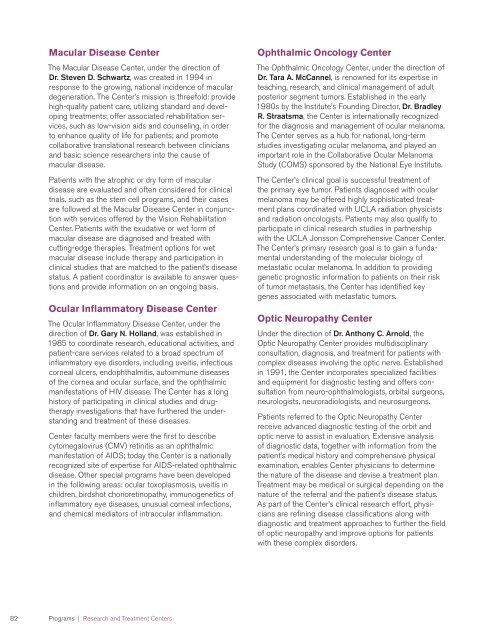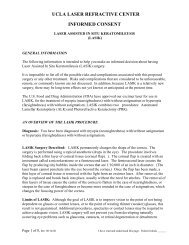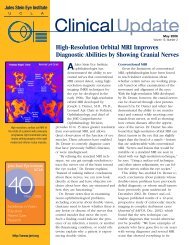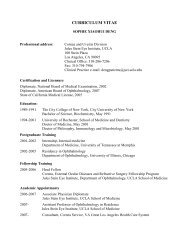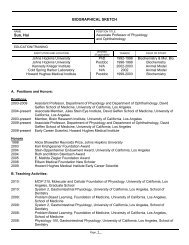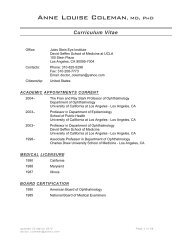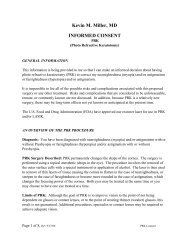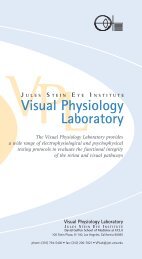View Annual Report - Jules Stein Eye Institute
View Annual Report - Jules Stein Eye Institute
View Annual Report - Jules Stein Eye Institute
Create successful ePaper yourself
Turn your PDF publications into a flip-book with our unique Google optimized e-Paper software.
Macular Disease Center<br />
The Macular Disease Center, under the direction of<br />
Dr. Steven D. Schwartz, was created in 1994 in<br />
response to the growing, national incidence of macular<br />
degeneration. The Center’s mission is threefold: provide<br />
high-quality patient care, utilizing standard and devel-<br />
oping treatments; offer associated rehabilitation ser-<br />
vices, such as low-vision aids and counseling, in order<br />
to enhance quality of life for patients; and promote<br />
collaborative translational research between clinicians<br />
and basic science researchers into the cause of<br />
macular disease.<br />
Patients with the atrophic or dry form of macular<br />
disease are evaluated and often considered for clinical<br />
trials, such as the stem cell programs, and their cases<br />
are followed at the Macular Disease Center in conjunction<br />
with services offered by the Vision Rehabilitation<br />
Center. Patients with the exudative or wet form of<br />
macular disease are diagnosed and treated with<br />
cutting-edge therapies. Treatment options for wet<br />
macular disease include therapy and participation in<br />
clinical studies that are matched to the patient’s disease<br />
status. A patient coordinator is available to answer ques-<br />
tions and provide information on an ongoing basis.<br />
Ocular Inflammatory Disease Center<br />
The Ocular Inflammatory Disease Center, under the<br />
direction of Dr. Gary N. Holland, was established in<br />
1985 to coordinate research, educational activities, and<br />
patient-care services related to a broad spectrum of<br />
inflammatory eye disorders, including uveitis, infectious<br />
corneal ulcers, endophthalmitis, autoimmune diseases<br />
of the cornea and ocular surface, and the ophthalmic<br />
manifestations of HIV disease. The Center has a long<br />
history of participating in clinical studies and drug-<br />
therapy investigations that have furthered the understanding<br />
and treatment of these diseases.<br />
Center faculty members were the first to describe<br />
cytomegalovirus (CMV) retinitis as an ophthalmic<br />
manifestation of AIDS; today the Center is a nationally<br />
recognized site of expertise for AIDS-related ophthalmic<br />
disease. Other special programs have been developed<br />
in the following areas: ocular toxoplasmosis, uveitis in<br />
children, birdshot chorioretinopathy, immunogenetics of<br />
inflammatory eye diseases, unusual corneal infections,<br />
and chemical mediators of intraocular inflammation.<br />
82 Programs | Research and Treatment Centers<br />
Ophthalmic Oncology Center<br />
The Ophthalmic Oncology Center, under the direction of<br />
Dr. Tara A. McCannel, is renowned for its expertise in<br />
teaching, research, and clinical management of adult<br />
posterior segment tumors. Established in the early<br />
1980s by the <strong>Institute</strong>’s Founding Director, Dr. Bradley<br />
R. Straatsma, the Center is internationally recognized<br />
for the diagnosis and management of ocular melanoma.<br />
The Center serves as a hub for national, long-term<br />
studies investigating ocular melanoma, and played an<br />
important role in the Collaborative Ocular Melanoma<br />
Study (COMS) sponsored by the National <strong>Eye</strong> <strong>Institute</strong>.<br />
The Center’s clinical goal is successful treatment of<br />
the primary eye tumor. Patients diagnosed with ocular<br />
melanoma may be offered highly sophisticated treatment<br />
plans coordinated with UCLA radiation physicists<br />
and radiation oncologists. Patients may also qualify to<br />
participate in clinical research studies in partnership<br />
with the UCLA Jonsson Comprehensive Cancer Center.<br />
The Center’s primary research goal is to gain a fundamental<br />
understanding of the molecular biology of<br />
metastatic ocular melanoma. In addition to providing<br />
genetic prognostic information to patients on their risk<br />
of tumor metastasis, the Center has identified key<br />
genes associated with metastatic tumors.<br />
Optic Neuropathy Center<br />
Under the direction of Dr. Anthony C. Arnold, the<br />
Optic Neuropathy Center provides multidisciplinary<br />
consultation, diagnosis, and treatment for patients with<br />
complex diseases involving the optic nerve. Established<br />
in 1991, the Center incorporates specialized facilities<br />
and equipment for diagnostic testing and offers con-<br />
sultation from neuro-ophthalmologists, orbital surgeons,<br />
neurologists, neuroradiologists, and neurosurgeons.<br />
Patients referred to the Optic Neuropathy Center<br />
receive advanced diagnostic testing of the orbit and<br />
optic nerve to assist in evaluation. Extensive analysis<br />
of diagnostic data, together with information from the<br />
patient’s medical history and comprehensive physical<br />
examination, enables Center physicians to determine<br />
the nature of the disease and devise a treatment plan.<br />
Treatment may be medical or surgical depending on the<br />
nature of the referral and the patient’s disease status.<br />
As part of the Center’s clinical research effort, physicians<br />
are refining disease classifications along with<br />
diagnostic and treatment approaches to further the field<br />
of optic neuropathy and improve options for patients<br />
with these complex disorders.


